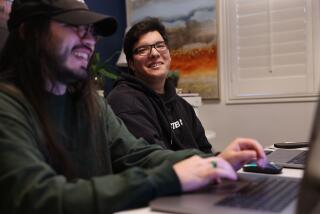No Lack of Communication : Families Overcome Deafness With Signing, Speech Training and Lip-Reading
- Share via
When Nita and Lewis Talbot’s daughter, Alaina, was 6 months old, they discovered she was completely deaf.
“We probably knew something was wrong with Alaina when she was 4 months old, because when I ground coffee beans every morning, she never startled, but I think we were in denial at first,” says Nita Talbot, 39, of San Juan Capistrano. “It was a hard blow for us.”
After tests confirmed deafness, Talbot was saddened by the realization that their daughter would never hear such simple pleasures as wind blowing through trees.
“I didn’t even let myself think about how the deafness would affect her personal relationships,” Talbot says. “That thought was too painful.”
For the Talbots, having a deaf daughter was life-changing. When Alaina was born, they were established in the community of Mammoth Lakes and doing well professionally and personally. No nearby services for deaf children existed, however, so, despite their love of the Mammoth Lakes area, they decided to move to Orange County, where Alaina could attend a school for the deaf.
“If we had stayed in Mammoth Lakes, our daughter would have grown up truly isolated and alone, thinking she was the only deaf person in the world,” says Talbot, now an educational sign language interpreter. “We wanted her to have a chance to become literate and reach her potential.”
The Talbots’ dream for their daughter, now 10, has come true.
Although she started out in deaf classes, Alaina, with her sign language interpreter, has attended the “hearing side” of her school since first grade. Now in fifth grade, she reads far above her grade level and plans to go to college.
“We gave up a lot, but it was worth it,” Talbot says. “We were able to give our daughter the biggest gift--a command of the world around her. Now her future is almost limitless. The experience has also made us draw closer as a family.”
Nine percent of the population age 3 years and older is deaf or hard of hearing, according to the U.S. Department of Health and Human Services. There are a number of possible causes for hearing loss, such as heredity, meningitis, chronic ear infections, rubella (while the mother is pregnant), CMV (cytomegalo inclusion virus) and Rh blood factor. Sometimes the reason for deafness is unknown.
Whatever the cause, having a deaf family member has its challenges, says Esther Zawolkow, co-founder of the S.E.E. Center for the Advancement of Deaf Children in Los Alamitos.
“When someone is deaf, communication is challenging and puts a big burden on the family,” Zawolkow says.
“People don’t realize how much effort each connection with your deaf child takes,” says Talbot, who signs and speaks to her daughter.
“If you want a well-adjusted deaf child, you need a lot of time and a supernatural amount of patience. Whenever you communicate, you must connect face-to-face and make sure your message is understood. You can’t just yell something across the room.”
Despite the challenges she and the rest of the family have faced communicating with Alaina, Talbot says she feels very close to her daughter.
“Because we must connect every time we communicate, I have a wonderful, rich relationship with Alaina,” Talbot says. “The deafness has taught me how to really listen to her without being distracted, and I know she appreciates my efforts.”
Alaina agrees. “I’m glad I can communicate with my parents and sister, because it makes me feel like part of the family, and I love them all very much,” she said through sign language interpreted by her mother.
Some children such as Alaina are completely deaf and need sign language to communicate. Others have residual hearing and may find lip-reading possible.
The S.E.E. Center encourages families to use a total communication approach, which means sign language, speech training and lip-reading.
Even when a child can lip-read, signing is still useful for the family, Zawolkow says.
“When family members sign, it opens up all kinds of doors for communication,” she says. “Without their own language, deaf children feel isolated. When the family can communicate through signing, deaf children are exposed to the world around them and learn the way hearing children do.”
Although not every family member knows signing, an increasing number of people are learning the language, Zawolkow says. “Our sign language classes are always full. Parents, siblings, grandparents and other extended family often attend.”
Larry Rosen’s son, Christopher, 7, has very little hearing but is able to lip-read well. The family also uses sign language to communicate.
“When we discovered that he was deaf at age 2, we decided it was best to use all modes of communication so we could give him every possible advantage,” says Rosen, 45, president of the S.E.E. Center and a professor of psychology at Cal State Dominguez Hills.
Rosen’s family learned to sign to communicate with Christopher, including his grandmother, who was in her 70s at the time.
“We have signing dictionaries all around the house,” says Rosen, who lives in Orange. “His grandmother’s dictionary was too heavy for her, so she took it to a printer and had it reduced in size. Her willingness to communicate with Christopher over the years has led to their having a very close relationship.”
Once Christopher was introduced to signing, he soaked it up rapidly, Rosen says.
“He began signing so much faster than all of us, it was hard to keep up,” he says. “It was if he was saying that he knew there was a way to communicate, but he couldn’t figure it out on his own. By the time he was 2 1/2, he had mastered 1,000 signs.
“We have never made his deafness seem like a problem, and he has an incredible self-concept because of our attitude,” Rosen says. “He attends a school with hearing children with the help of a sign language interpreter and does very well.”
Rosen and his wife had suspicions that something was wrong earlier, but their doctor said Christopher was fine. Their experience is not uncommon. The average age for discovery is 2 1/2, Zawolkow says. This occurs because young children aren’t routinely given hearing tests, and when they fail to advance they are often labeled slow to speak.
Discovering deafness this late is unfortunate, says Zawolkow, who educates parents about the benefits of early discovery.
“Most language is learned in the first five or six years of life, so when there is a delay in learning due to deafness, it’s much harder for the children to catch up,” she says.
Children can be signed to when they are born and will begin signing back at about 12 months, when hearing children begin speaking.
Bridget Wenner of Tustin was fortunate to discover her daughter’s deafness when she was just 10 days old. Wenner and her family immediately took sign language and began signing to her.
“It’s amazing what signing has done for her,” says Wenner, 36. “She’s now 2 1/2 and progressing like any other toddler.”
When Wenner discovered that her newborn was deaf, she decided to quit her 12-year job at the gas company to stay home and teach her daughter.
“Taking proper care of a deaf child is challenging and time consuming,” says Wenner, who has two other children. “Besides her speech therapy lessons three times a week, I go to a signing class once a week and a support group on another day.
“I am also constantly teaching her. You can tell hearing children something 10 times, and they understand it, but it takes many more repetitions for a deaf child,” she says. “By the end of the day, I’m exhausted, but the rewards of working with her have been worth it. I don’t think she would have done as well as she has if I hadn’t devoted my time to her.”
The rigors of caring for a deaf child have taken their toll on Wenner’s other relationships.
“I strive hard to make sure that my deaf daughter feels a part of everything. As a result, the sheer volume of attention she receives has caused my other children and husband to sometimes feel left out,” she says.
Quitting work has also created financial pressures for the couple, but Wenner says the sacrifices they’ve made have been well worth it.
“I’ve developed a really good relationship with my daughter. She’s such a joy, and I wouldn’t have done things any other way.”
* Saturday at 8 p.m., hearing-impaired comedian Kathy Buckley will perform at “A Night of Mirth and Magic,” which will benefit the S.E.E. Center. The show will be held at Chapman University Auditorium in Orange. Tickets are $15 each. Call (310) 430-1467 V/TDD for tickets.
More to Read
Sign up for Essential California
The most important California stories and recommendations in your inbox every morning.
You may occasionally receive promotional content from the Los Angeles Times.













